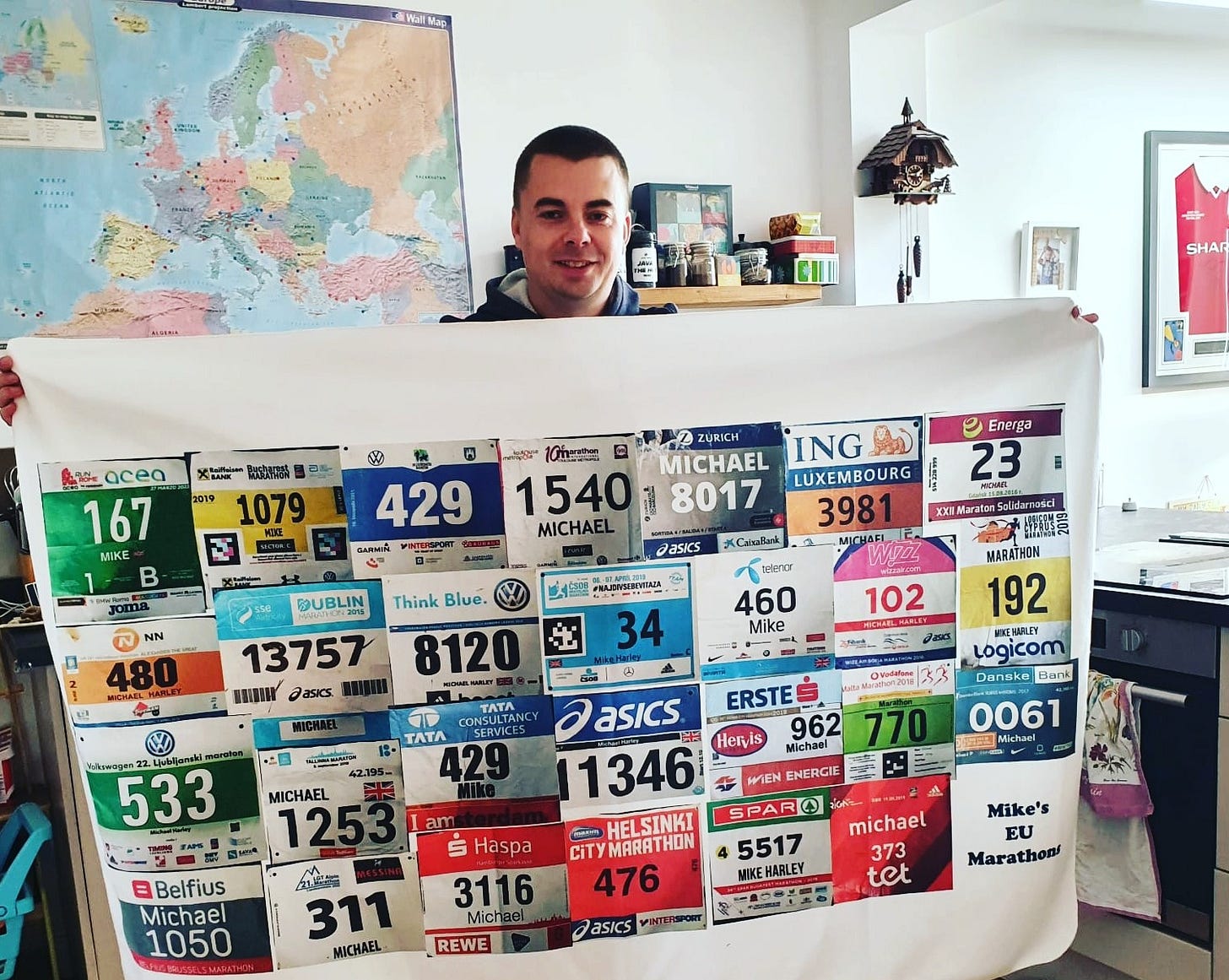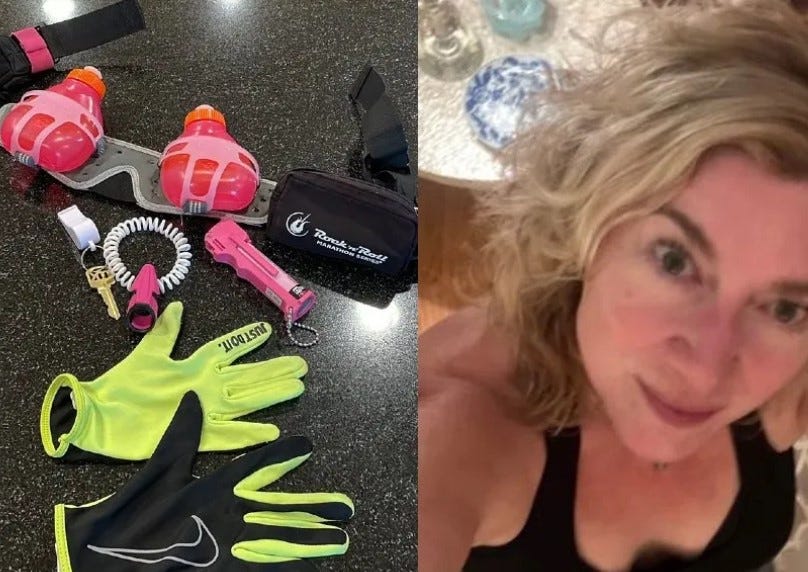Conquering Europe: The marathon man raising awareness of ME
Mike Harley ran a marathon in all 27 countries in the European Union
It is a journey that took in 27 different countries and as many marathons, saw almost £50,000 raised for charity and increased awareness of those suffering from chronic fatigue syndrome, ME.
But back in 2015 when Mike Harley decided to run a marathon in every member state of the European Union, he “couldn’t really run to the end of my road”.
Spurred on by thoughts of a childhood friend with the condition and conversations with people with ME across Europe, Mike completed races in countries as varied as Cyprus, Estonia and France.
Despite calling himself “not particularly athletic,” Mike finished the challenge in Rome last year - and promptly booked his next set of marathons.
The only target he missed along the way was running a marathon in the capital of what had been an EU state when he started the challenge - London.
He had intended to finish his goal there, but a certain referendum put paid to the need for that.
Mike had always wanted to do something in aid of an ME charity.
The syndrome, whose full name is Myalgic Encephalomyelitis, effects around 250,000 people in the UK, 10% of which are children.
It’s most well known symptom is chronic fatigue, but those with ME also suffer from muscle and joint pain, headaches, and extreme sensitivity to light or sound.
“The best way I can describe it is waking up in the morning with 10% battery and having to make that work for the whole day,” Mike said.
“It can effect everybody differently, from not being able to work or being housebound right through to people who literally cannot get out of bed and are shut behind curtains for years with no treatment and no normal life.
“My childhood friend, Ian, contracted ME after picking up a virus while skiing. He told me about the various charities that aim to help people with ME.
“One of those was Invest in ME Research. They are different in that they are voluntarily run - none of the money goes to salaries or marketing so every single penny goes to clinical, bio-medical research.”
The company, which is based in Norwich, only has a handful of volunteers but runs initiatives including funding PHDs for people studying ME, holding an annual event every year in London to bring together the best researchers and scientists in the world, and - for the first time this year - running the UK’s only clinical trial to try and find a cure for ME.
Not doing things by ‘halfs’:
Back in 2015, while staring at a map, Mike had come up with the idea of taking on a marathon race in every EU country.
He immediately thought a series of marathons in the UK wouldn’t be enough.
“UK marathons are great and I love the experience of London, but it was about reach,” he said.
“How could I help promote the problem facing people with ME, the lack of government funded bio-medical research, the lack of interest in it?
“Would I be able to do that by doing it in various cities around the UK? Possibly, but I thought it would be great to get to other countries, interview people with ME, meet the ME associations and find out what is happening in each country, see if I could introduce them to the charity and get them involved in the conferences.
“I was aware of how many people around Europe have ME. It is a massive issue.”
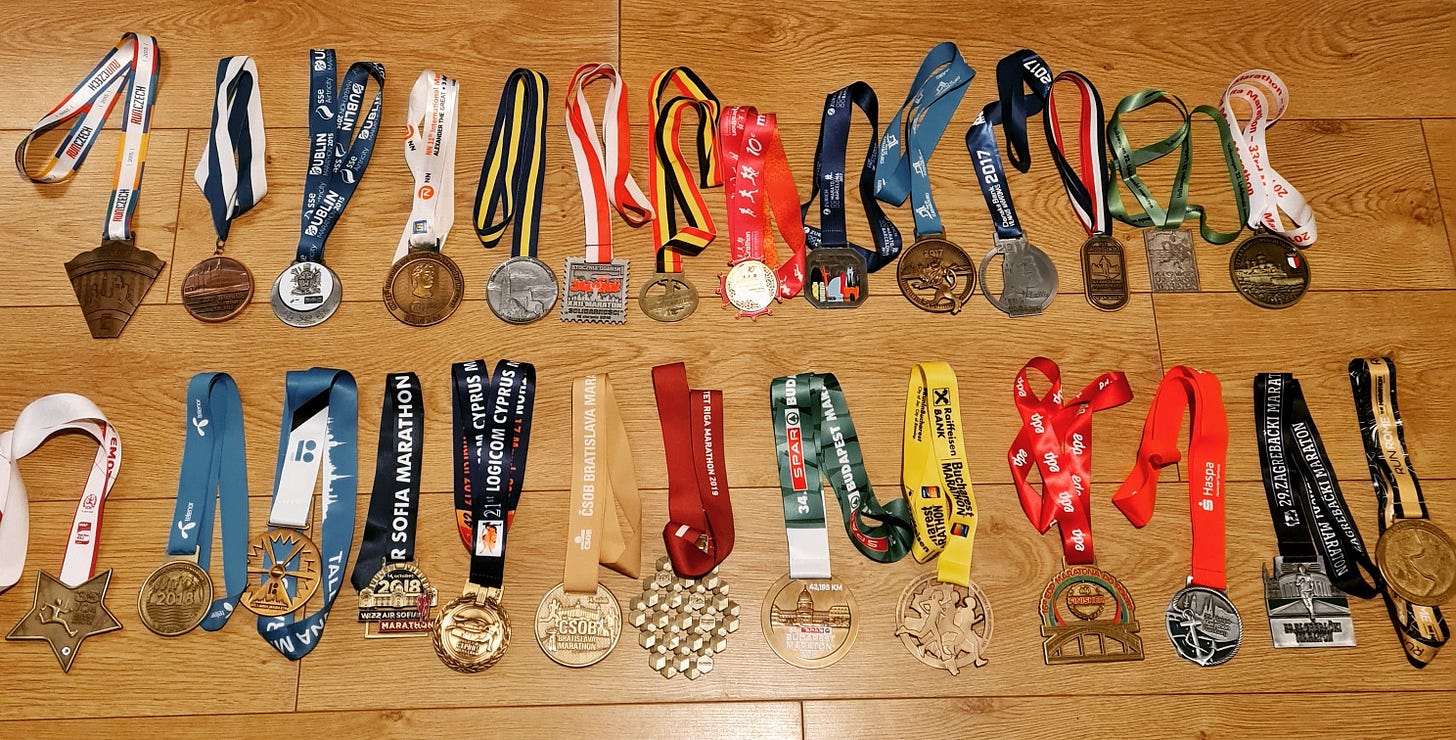
After an original plan to run a marathon race in every country in Europe was scuppered when he discovered many of the smaller places only put half marathons on, Mike decided to use the European Union as his new running playground.
“I didn’t want to do things by ‘halfs’,” he said. “I thought maybe I would do one or two a year, but I met another runner through Invest in ME, who was doing the North Pole Marathon, and he said one or two a year would take me a really long time, he asked if I was sure people were going to follow me and be interested in that?
“So I started ramping it up to five or six a year.”
Despite the coronavirus pandemic providing what was a considerable mid-event headache, Mike was soon taking in marathons in everywhere from Prague to Malta, Ljubljana to Amsterdam.
He said: “I did the challenge for charity, but also to rediscover to love for running and running marathons.
“I did the London Marathon when I was 18 in 2001, but didn’t do a lot more running until I was 32.
“I just wanted to see if I could run another one. I love travelling as well, going around Europe and seeing different cities. It was great to put those two things together.”
Also on Running Tales:
Mike said he hadn’t been doing any running when he started the challenge, but had been keen to learn about the sport and about taking on marathons.
“I bought a load of books, listened to a lot of podcasts, chatted to a lot of people and over time learnt the do’s and don’ts, and what works for me and what doesn’t.
“I’m not naturally athletic. I like a pint, and steak and pies. I’m not running every single day of the week.
“Recovery is as important as the running itself, as well as making sure I’m looking after myself with stretching, getting plenty of massages, drinking well, but also pacing.
“I used to go out fast, as every one does when they start running, and after a couple of miles be completely whacked. There have been plenty of races where I’ve gone off too quickly and hit the wall. You learn from each one.”
Logistical lessons and favourite cities:
Mike said one of the biggest challenges was the logistics of getting to different parts of Europe for various races - and planning when to run where.
“It has been quite tricky,” he told Running Tales. “For example, getting to Tallinn, you have to get to Finland and then catch a propellor plane.
“For nearly every race I had to get to London - I’ve been to all the airports there. Living out in Bristol, there are not that many convenient flights at the right times.
“Scheduling the races was hard. If anyone runs lots of European marathons, you realise they are usually congregated around April and October. In some cases you have maybe nine races happening on the same day.
“You’ve got to make sure you don’t end up with none one year and then six the next.
“I had to go a little bit off-piste. I wanted to do all the capital cities at one point, but that clashed too much, so I ended up doing Barcelona instead of Madrid, Thessaloniki instead of Athens.”
Choosing which cities were his favourite also presented issues - with his performance in each marathon casting a shadow or smile over the city it took place in.
“I had an absolute nightmare in Riga,” Mike said. “It was my worst race as I was injured.
“For it not to effect your experience of the city or your weekend is hard. You have to detach your time from the trip.
“Quite a lot of the cities, particularly in Eastern Europe, were really surprising. A lot of cities that have joined the EU recently have had a lot of investment, and they have benefitted from being part of it.
“Estonia, Latvia and Lithuania have always been great races, really well supported, with beautiful architecture. The courses itself were great, with good weather.
“Vilnius stands out. There’s loads to do. It’s a nice, tight little city, very quirky. They’ve got a very keen sense of humour over there and the race is great, the course is brilliant.”
Mike also made special mention of the Luxembourg Marathon: “It’s a night race, starting at 7pm on a national holiday, so there is a carnival atmosphere around the city.
“At one point, it drops into the old city which is very Medieval - a bit like Bruges - and you run through a night village lit up by lanterns.
“Just as you get used to all of that, there is this absolutely killer hill and then it finishes in a huge sports hall, with loads of celebrations going on.”
How the challenge heated up:
Mike said one factor he hadn’t expected to face was just how hot it would be at each of the marathons he took on - with even those in relatively temperate climes recording high temperatures.
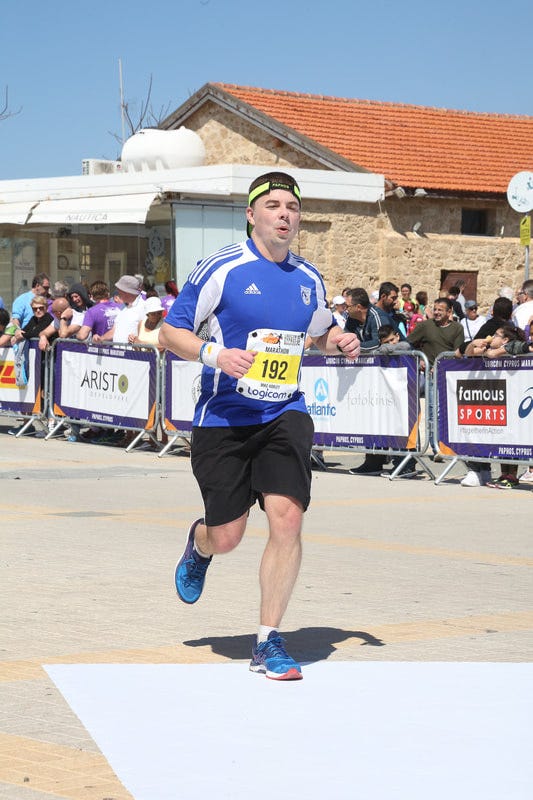


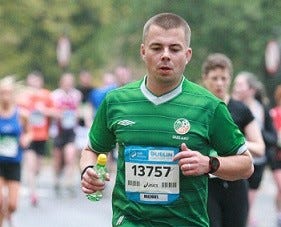
“More than half of the races I’ve done have been more than 25 degrees at the start.
“I think the hottest was in Vienna - it was 34°C (93°F) at one point. I was seeing people fainting left and right.
“My partner and I joke about it. We land someone and there will be a freak heatwave. You are on the start line, thinking ‘this is going to be tough’.
“Paphos, in Cyprus, starts early but it seems to creep up five or six degrees an hour, which is quite something. I remember the last two miles, running along the strip back to the castle and everyone is having beers and a great time, and you are in a world of pain wanting it to end.
“The island marathons have been great. Malta starts in a village in the centre, which has been used for filming Game of Thrones. Everyone is running around taking pictures of the old ruins and churches.”
Mike, who said his marathons times “hover between three hours 45 and four hours 15”, added: “I’ve learnt I run best in cold and wet weather, but if you live in northern Europe and most of your races are in southern or central Europe, you have to get used to the fact it is going to be 10-15 degrees warmer wherever you go.”
Raising awareness - Meeting those who are spied on for having ME:
One of the major reasons Mike wanted to take the challenge throughout Europe was to look at, and raise awareness of, the different ways it is treated across the continent.
He was also keen to talk to people with the condition and to promote their stories.
Mike recorded the stories of people with ME he met around Europe on his website, Mike’s EU Marathons
In each place he did a marathon, he would contact people with ME and, if they were well enough, record their story.
By combining those real life stories with that of his own marathon challenge, Mike was able to get local newspapers and the websites of the events he was running to publish stories to raise awareness about ME.
“It’s a lot worse in some parts of Europe for ME healthcare,” he said. “A lot of people just don’t believe it is a condition, they believe it is psychological.
“A lot of people are denied benefits or spied on to see if they are well enough. It really varies from country to country, but the one thing I did find was a complete lack of awareness as to what ME was.
“If anyone was well enough to cheer me at a race, then that happened as well. It brought the trips alive to me.
“It wasn’t just me going on holiday, running marathons. To have people with ME there to meet or cheer me on defined the whole thing.
“I had a habit of writing names on my hand - anyone in a country who I had met, or knew of with ME. When it got to that 20 to 23 mile bit when you are not sure you are going to do it, you just look at your hand and it gives you a buzz.”
Fundraising - and deciding not to stop:
As well as increasing awareness and telling people’s stories, Mike was keen to raise as much money as possible through the challenge.
He quickly eclipsed his original target of £26,200 - an amount echoing the marathon distance in miles - so decided to increase that to £42,195, a reflection of the distance in kilometres.
“We hit that the night that I finished the last race,” he said. “I was having dinner in Rome and got the message we had made it.
“After that 27th race I broke down. My daughter was there - the little three-year-old - and she gave me a big hug.
“It was just huge, pent up emotion coming out. I never really felt I could do it until I had maybe seven or eight left. I still had that doubt.
“For someone as ordinary at running as me to do that was just surprising.
“It was the end of the journey, and I’d had a lot of amazing messages and good wishes over that time, made a lot of friends within the ME community. It felt like the end of an era.
“I had been thinking what I was going to do next, thinking ‘I don’t need a massive anti-climax or crash’.
“A lot of people do these big challenges and then have elements of depression as it had been such a big part of their life.
“I recognised I could feel like that, so I booked a couple of extra races as a kind of Methadone, to get over that horrible empty feeling.
“I upped the target to £50,000 and thought I would go down the bucket list of everywhere else in Europe, that maybe isn’t part of the EU, that I would really like to visit, and see if I could find more people with ME and elevate their stories.”
Since then he has completed two more marathons - the Liechtenstein Alpine Marathon and Florence Marathon, and has two more booked, the next of which will see him head of to Bergen in Norway.
“There’s always more marathons,” Mike said. “On my list I have places like Bosnia, Albania, Montenegro.”
Not bad for someone who couldn’t run to the end of the road.




